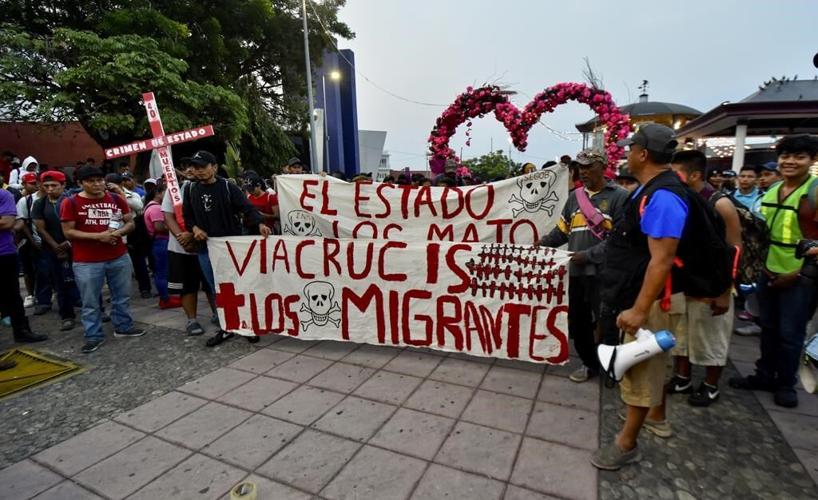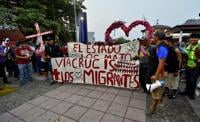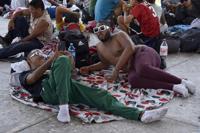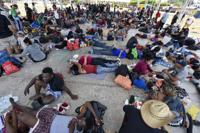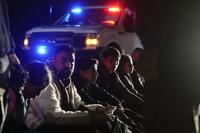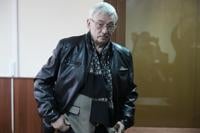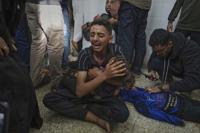TAPACHULA, Mexico (AP) — Around 3,000 migrants set out Sunday on what they call a mass protest procession through southern Mexico to demand the end of detention centers like the one that caught fire last month, killing 40 migrants.
The migrants started from the city of Tapachula, near the Guatemalan border. They say their aim is to reach Mexico City to demand changes in the way migrants are treated.
“It could well have been any of us,” Salvadoran migrant Miriam Argueta said of those killed in the fire. “In fact, a lot of our countrymen died. The only thing we are asking for is justice, and to be treated like anyone else.”
, which is almost always their goal. The migrants are mainly from Central America, Cuba, Venezuela, Ecuador and Colombia.
Mexican authorities have used paperwork restrictions and highway checkpoints to bottle up tens of thousands of frustrated migrants in Tapachula, making it hard for them to travel to the U.S. border.
Argueta said that when migrants look for work in Tapachula, “they give us jobs, perhaps not humiliating, but the one the Mexicans don't want to do, hard work that pays very little.”
Organizer Irineo Mújica said the migrants are demanding the dissolving of the country’s immigration agency, whose officials have been blamed — and some charged with homicide — in the March 27 fire. Mújica called the immigration detention centers “jails.”
The roots of the migrant caravan phenomenon began years ago when activists organized processions — often with a religious theme - during Holy Week to dramatize the hardships and needs of migrants. In 2018 a minority of those involved wound up traveling all the way to the U.S. border.
This year’s mass walk began well after Holy Week had ended, but Mújica, a leader of the Pueblos Sin Fronteras activist group, called it a “Viacrucis,” or stations of the cross procession, and some migrants carried wooden crosses.
"In this Viacrucis, we are asking the government that justice be done to the killers, for them to stop hiding high-ranking officials," Mújica said in Tapachula before the long walk began. “We are also asking that these jails be ended, and that the ��ɫtv Immigration Institute be dissolved.”
Some migrants carried banners or crosses reading “Government Crime” and “The Government Killed Them.”
The migrants made it only as far as the town of Alvaro Obregon, about 9 miles (14 kilometers) from Tapachula, before stopping to settle down and rest for the remainder of the day, after having walked from around dawn.
The migrants stretched out under a covered athletic court and under trees at a park in Alvaro Obregon. There was no sign at the start of any police attempt to block them.
Mexican prosecutors have said they will press charges against the immigration agency’s top national official, Francisco Garduño, who is scheduled to make a court appearance April 21.
Federal prosecutors have said Garduño was remiss in not preventing the disaster in Ciudad Juarez despite earlier indications of problems at his agency’s detention centers. Prosecutors said government audits had found “a pattern of irresponsibility and repeated omissions” in the immigration institute.
The fire in Ciudad Juarez, across the border from El Paso, Texas, began after a migrant allegedly set fire to foam mattresses to protest a supposed transfer. The fire quickly filled the facility with smoke. No one let the migrants out.
Six officials of the ��ɫtv Immigration Institute, a guard at the center and the Venezuelan migrant accused of starting the blaze are already in custody facing homicide charges.
Migrants, especially poorer ones who cannot afford to pay migrant smugglers, have often seen such mass walks, or caravans, as a way to reach the U.S. border. Successive caravans grew to massive size in 2018 and 2019 before authorities in Mexico and Central American began stopping them of highways.
The COVID-19 pandemic also played a role in quashing the caravans, as countries instituted health restrictions.
The heat and sheer effort of walking 750 miles (1,200 kilometers) to Mexico City usually forces migrants to start walking in the pre-dawn darkness and stop in the early afternoon in towns along the way.
Many of the migrants — some carrying infants or babies in strollers — also look to catch rides from passing trucks. In the past, authorities have sometimes allowed that to happen, and sometimes prohibited it. But sheer desperation drives many of the migrants.
Venezuelan migrant Estefany Peroez was walking with her three daughters. In Tapachula, they had been sleeping in the streets.
“We don't have anything to eat, the authorities don't help us, we are doing this to give my daughters a better life,” Peroez said.

